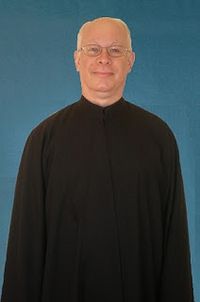 Protodeacon Theodore Feldman. Photo: byztex.blogspot.com Up here in Canada, where the winters are cold and the liberal propaganda relentless, we are just concluding Pride Month. But, as a wise person recently said to me, at the Orthodoxy in Dialogue website it is always Pride Month. It was not surprising therefore to read there yet another piece promoting the ecclesiastical legitimation of homosexual activity entitled, “LGBTQ+ In Our Churches” by Protodeacon Theodore Feldman (at left), who serves under Fr. Arida at the OCA Holy Trinity Cathedral in Boston.
Protodeacon Theodore Feldman. Photo: byztex.blogspot.com Up here in Canada, where the winters are cold and the liberal propaganda relentless, we are just concluding Pride Month. But, as a wise person recently said to me, at the Orthodoxy in Dialogue website it is always Pride Month. It was not surprising therefore to read there yet another piece promoting the ecclesiastical legitimation of homosexual activity entitled, “LGBTQ+ In Our Churches” by Protodeacon Theodore Feldman (at left), who serves under Fr. Arida at the OCA Holy Trinity Cathedral in Boston.
The piece contains little that is new, and one is tempted to simply dismiss the whole thing as yet another reissue of the same tired arguments always trotted out on Facebook to legitimate homosexuality and subvert the Church’s Tradition. One cannot rush to refute every piece of ideological inanity one finds online, since most of us already have full-time jobs. Some of the arguments the Protodeacon uses in his piece are so irrelevant as to be almost content-free, such as his argument from our worship that since at the Chalice we confess that we are chief among sinners we cannot exclude anyone from receiving Holy Communion there. The fact that we are all sinners is true, of course, but is irrelevant to the issue at hand, which is of whether homosexual activity is sinful and whether the one approaching the Chalice has repented of the sin and is striving to resist it.
More interesting and worth responding to are the Protodeacon’s comments about the use of the Old Testament. He writes: “The Old Testament book of Leviticus includes many commandments that we do not keep—for example, do not wear clothing woven of two kinds of material (19:19), do not trim your beard (19:27), do not sacrifice an ox outside the camp (17:3-4), render ‘an eye for an eye, a tooth for a tooth’ (24:19-20). Those who cite 18:22 and 20:13 (do not ‘lie with a male as with a woman’) as prohibitions against homosexuality pluck them from a whole that we no longer countenance. In doing so—in selecting those commandments that they consider applicable to our culture—they confess to discerning how to apply Scripture to our lives. But then we may contest their discernment and counter that these verses, like the others, do not make sense in our culture. We cannot anyway recover the intent of these two verses from Leviticus. The Hebrew words here that are often claimed as targeting homosexual behavior appear nowhere else in the Old Testament. And so they are impossible to translate reliably. We can recover neither their proper meaning, nor their intended target, nor their context in a society so far removed from our own as to make even ordinary daily activities incomprehensible.”
This brings up two questions: 1. What does the text referring to homosexuality in Leviticus 18:22 mean, and 2. Is it applicable to us in the Church today?
We first examine the question, “What does Leviticus 18:22 mean?” It is odd for the Protodeacon to say “The Hebrew words here that are often claimed as targeting homosexual behavior appear nowhere else in the Old Testament. And so they are impossible to translate reliably.” It is simply not so, and one wonders if perhaps the Protodeacon is mixing up the Hebrew of Leviticus 18:22 with the Greek arsenokoitai of 1 Corinthians 6:9—though the meaning this latter is still clear, since here Paul simply creates a word using the words found in the Septuagint version of Leviticus 18:22. But let us examine the Hebrew of Leviticus 18:22, which the Protodeacon says uses words which “appear nowhere else in the Old Testament”.
The Hebrew word there usually translated “male” is zakar, and is the same word used in Genesis 1:27, where it is paired with the word translated “female” and refers to the two genders which God made: “male and female He created them”. The word in Leviticus 18:22 usually translated “woman” is ishah, the same word used in Genesis 2:23 and refers to the woman who was created from the man: “she shall be called Woman [ishah] because she was taken out of Man [ish]”. The Hebrew word in Leviticus 18:22 usually translated “lie” is shakab, and is found also in Deuteronomy 22:22, where it described the adulterous act of one lying with another man’ wife. The Hebrew word in Leviticus 18:22 which describes this forbidden homosexual act is to’ebah, usually translated “abomination”. The word is often found in the Old Testament, such as in Deuteronomy 7:26, where is describes pagan idolatry. The Hebrew words used in Leviticus 18:22 therefore are in fact found throughout the Old Testament, and their meaning could scarcely be clearer.
The meaning is so clear, in fact, and so unwelcome (at least to certain people such as the Protodeacon) that some have tried to evade the force of it by suggesting that this text prohibited not homosexuality per se, but only when it was found in certain idolatrous contexts. Thus the rendering of Leviticus 18:22 in the so-called “Queen James Bible”: “Thou shalt not lie with mankind as with womankind in the temple of Molech: it is an abomination” (italics mine). It hardly needs pointing out that the text itself offers no suggestion that the sin was so narrowly contextualized or that it contains no reference to a temple of Molech. A comparison of a similar prohibition in the next verse suggests exactly the opposite. Leviticus 18:23 reads, “And you shall not lie with any beast and defile yourself with it, neither shall any woman give herself to a beast to lie with it; it is perversion”.
The “Queen James Bible” translators want us to imagine that homosexual acts were only proscribed if committed in a temple of Molech but were presumably just fine if committed in an Israelite tent. Would they also suggest that acts of sexual bestiality were similarly proscribed only in such idolatrous locales, but were fine in an Israelite barnyard? The context is clear that the reason for the proscription was the same in both verses: “it is perversion” (Hebrew tebel, used also in Leviticus 20:12 to describe incest with one’s daughter-in-law).
There is nothing for it: Leviticus 18:22 forbids sexual relations between two men, describing it as an abomination. The “target” of this verse was anyone who was tempted to commit a homosexual act (or, in Leviticus 18:23, an act of bestiality); its “context” was the Israelite community in covenant with God, who demanded sexual purity from His covenant people.
The second question which the Protodeacon’s piece brings up is: “Is this text applicable to us in the Church today?” Here the Protodeacon’s lack of expertise with the Old Testament becomes more apparent, as he throws into the mix a number of disparate verses with no attempt to understand their varied contexts. His basic point, worthy of Marcion, seems to be that because certain precepts in the Old Testament no longer directly apply to us today as they did to the Israelites (such as the prohibition about trimming beards, which he cites with no concern for its original context) that anything which we dislike in the Old Testament can be thrown into the dumpster.
It is clear that certain commands in the Old Testament presupposed a theocratic covenant community in the Iron Age; it is also clear that certain other commands are eternally and universally applicable. Some of the latter include the necessity of monotheism (Exodus 20:3), a concern for the poor (Deuteronomy 15:7-11) and the prohibition of murder (Exodus 20:13). These things should not be considered as “plucked from a whole that we no longer countenance”. They make perfect sense in our culture—as does the prohibition of homosexuality. It is not true that this prohibition of homosexuality “does not make sense in our culture”, but only that it is emphatically unwelcome in our culture—which is something entirely different.
The question about “discerning how to apply (Old Testament) Scripture to our lives” and deciding which Old Testament prohibitions are directly applicable (for some are indirectly applicable, such as the prohibition of muzzling an ox while it threshes; see 1 Corinthians 9:9) is not decided on the arbitrary basis of which ones we happen to like. It is done on the basis of how the Old Testament material is used by the writers of the New Testament. Thus, for example, the Old Testament precept forbidding the eating of pork is no longer applicable because the apostles, following their Lord, insisted that all food is now clean for us (1 Timothy 4:3, Romans 14:14, Mark 7:19). But the Old Testament precept forbidding homosexual acts is still applicable because the apostles such as Paul clearly condemned homosexual acts in Romans 1:26, saying that they were “against nature”, παρα φυσιν/ para physin, a passage whose meaning is clear, notwithstanding the Protodeacon’s attempt to sweep it under the rug by jumping from Romans 1 to Romans 2 as if the latter somehow cancelled out the former.
Further, our traditional exegesis of the apostolic material is confirmed by examining how the Church has always understood it—viz. as condemning all homosexual acts regardless of their context. To suggest that the Holy Tradition is silent on the matter is nonsense, as any quick perusal of patristic writings will attest. Dismissing the unanimous consensus of the Fathers on this matter as if it were simply their “opinions growing out of their own cultural context, but not out of Christ’s word” is breathtakingly irresponsible. But it does reveal the central difference between the Fathers and the Protodeacon: for the Fathers, the witness of Scripture was paramount and authoritative; for the Protodeacon, what is paramount and authoritative is the view held by our secular culture.
Ultimately the issue is not about this or that text of the Old Testament, or even about the texts of the New Testament. It is our willingness to oppose the views of our secular culture if they contradict the consistent witness of the Church. The secular world’s view of LGBTQ+ is radically incompatible with the word of Christ and the teaching of His Church. One therefore has to choose a side. The Protodeacon has chosen his. We must choose ours.





Father Lawrence's efforts against these perverts are encomiable indeed, but sometimes I think it's a defilement even just taking them seriously.
Anyway, the real question, the ultimate question, is what John has posed: WHAT DOES IT TAKE TO BE EXCOMMUNICATED TODAY IN THE OCA? Why the hierarchy is again and again silent on this shameful preaching there?
The best question that I've seen so far. perhaps all clergy should read the 23rd chapter of Jeremiah each day before we open our mouths.